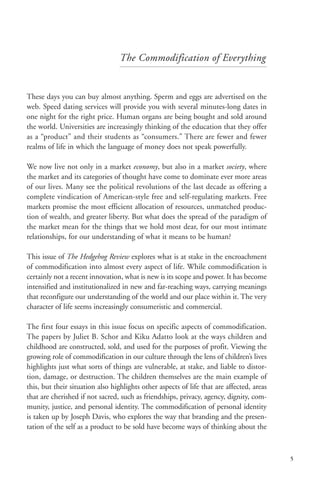
Commodification for everything
- 1. 5 The Commodification of Everything These days you can buy almost anything. Sperm and eggs are advertised on the web. Speed dating services will provide you with several minutes-long dates in one night for the right price. Human organs are being bought and sold around the world. Universities are increasingly thinking of the education that they offer as a “product” and their students as “consumers.” There are fewer and fewer realms of life in which the language of money does not speak powerfully. We now live not only in a market economy, but also in a market society, where the market and its categories of thought have come to dominate ever more areas of our lives. Many see the political revolutions of the last decade as offering a complete vindication of American-style free and self-regulating markets. Free markets promise the most efficient allocation of resources, unmatched produc- tion of wealth, and greater liberty. But what does the spread of the paradigm of the market mean for the things that we hold most dear, for our most intimate relationships, for our understanding of what it means to be human? This issue of The Hedgehog Review explores what is at stake in the encroachment of commodification into almost every aspect of life. While commodification is certainly not a recent innovation, what is new is its scope and power. It has become intensified and institutionalized in new and far-reaching ways, carrying meanings that reconfigure our understanding of the world and our place within it. The very character of life seems increasingly consumeristic and commercial. The first four essays in this issue focus on specific aspects of commodification. The papers by Juliet B. Schor and Kiku Adatto look at the ways children and childhood are constructed, sold, and used for the purposes of profit. Viewing the growing role of commodification in our culture through the lens of children’s lives highlights just what sorts of things are vulnerable, at stake, and liable to distor- tion, damage, or destruction. The children themselves are the main example of this, but their situation also highlights other aspects of life that are affected, areas that are cherished if not sacred, such as friendships, privacy, agency, dignity, com- munity, justice, and personal identity. The commodification of personal identity is taken up by Joseph Davis, who explores the way that branding and the presen- tation of the self as a product to be sold have become ways of thinking about the
- 2. 6 T H E H E D G E H O G R E V I E W / S U M M E R 0 3 self in community. What does this mean, Davis asks, for our under- standing of authenticity, our relationships to others, and our very being as selves? Graham Ward’s piece suggests that the commodification of reli- gion is the fitting, final stage in capitalism’s commodification of every- thing, since capitalism, as Marx understood it, is essentially religious in nature. He suggests that the cultural movement towards a post-secular virtual reality needs to be resisted by other forms of exchange, particular- ly those found in religious traditions with practices, rituals, and symbols that are outside the realm of capitalist commodification. The last two articles take a broader look at commodification. George Ritzer and Mike Ryan’s essay provides greater clarification about com- modification on the global scale by introducing two terms into the dis- cussion—glocalization and grobalization—that help to reveal the continuum of the ways that the local and the global intersect in terms of commodification. Michael Sandel’s essay looks at the reasons we give for resisting the commodification of certain areas of our lives. He dis- tinguishes between two often-elided rationales for this resistance—the argument against coercion and the argument against corruption—to suggest that there may be some things that money shouldn’t be able to buy. Rounding out the issue are an interview with Stanford law profes- sor Margaret Jane Radin, a review of Tyler Cowen’s Creative Destruction, and an annotated bibliography on commodification. In this issue we are attempting to understand the cultural significance of the fact that commodification—the process of transforming things into objects for sale—has become a totalizing cultural force. This phe- nomenon raises a whole range of pressing questions: What forces, pres- sures, and cultural changes drive this tendency to commodify? Is anything resistant to commodification? What happens to democracy and political order, marriage and the family, religion and morality, iden- tity and our understanding of the human person when they are con- ceptualized under market categories? What sorts of changes occur when we begin seeing our basic relationships with ourselves, each other, and the world as commodities? Are there any realistic alternatives to a con- sumer society dominated by commodification? — T.H.R.
